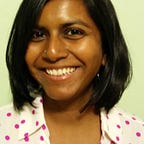Sana’s Honest Account of Transitioning to Tech
Sana shares her journey and the hard work it takes to go from a novice to a professional developer
Tell us about yourself
I studied Political Science and Spanish at the University of Maryland. Since graduating I’ve worked in multiple fields from union organizing to digital communications to now software development.
As a Developer at the National Journal, I get to work on both the front and back end of our application. I get super excited about things like test-driven development, the 12-factor app methodology, and diversity in the tech field.
Outside of work, I co-organize Prince George’s Tech Meetup. I felt compelled to organize this meetup given the lack of diversity in the tech field. This month we hit 250 members and established a partnership with the University of Maryland to host our events.
Tell us about your first tech job. Was it hard to find your first position?I’m not going to lie — the path from novice to professional was really tough and it took a lot of work.
In the year and a half before I got my first full-time position, I took 10 online courses that covered Python, Ruby, Java, and C. Additionally, I completed General Assembly’s Back-End Web Development program in Ruby and Ruby on Rails. I was also a Fellow at Code for Progress which is how I met Veni!
As a woman of color without a computer science degree, I knew I needed to prepare as much as possible if I wanted to be taken seriously in this field. That practice and preparation helped me a lot with my first tech job which was at the New America Foundation.
When I joined, I was the only developer and I was tasked with building a new content management system (CMS). It was a tremendous undertaking. It required many late nights and weekends but I learned so much during my time there.
Is coding hard?
When I was learning to code, someone introduced me to the concept of growth mindset. It completely blew my mind. Since then, I’ve refused to believe that something is “hard” or that I can’t do something because I’m missing some innate quality that others might have.
It’s a tough thing to internalize but I’m constantly reminding myself that if I work hard enough, I can learn anything.
This is also why I refuse to believe some people are better suited for tech careers while others are not. I really believe that with enough time and resources, everyone can learn.
Is it important to have mentors and mentor other people? Why?
It’s important to note that learning and succeeding in this field are two very different things. Sexism and racism are very real factors that push and keep many people out of the tech field.
Even the most brilliant and experienced people end up leaving tech because of how toxic it can be. As a woman or person of color, you’re almost guaranteed to be second-guessed and overlooked. This is why the support of community and mentors is so essential.
My peers and mentors have been instrumental in validating the challenges and struggles I’ve faced while also reminding me that I am capable of tackling those difficulties. Sometimes it can be awkward to establish a formal mentor/mentee relationship, but I encourage you to take the first step and reach out.
If you’re reading this and would like someone to talk to, feel free to drop me a line! (Twitter: @sanacodes)
What are the most important skills to have for someone in your position?
I think the most important skill in software development is persistence. You will absolutely get stuck. Sometimes for days, sometimes multiple times a day.
I always try to remind myself that there is a solution out there and if you don’t know how to do it, you will figure it out with enough time (#growthmindset). It’s also important to take a step back and regroup when you feel your brain is fried.
Don’t be afraid to search Stack Overflow or ask questions on Slack or Google groups. No one has all the answers — and I mean, no one. Not even people with decades of experience.
Someone once told me that an experienced programmer is someone who has seen more errors. This inspired me to start keeping a notebook of errors that I encountered — especially ones that took a long time to debug.
What resources did you find most helpful?
Some of my favorite newsletters are Django Digest, Hacker Newsletter, Changelog Weekly, Code Newbie, Javascript Weekly and Python Weekly. I also like reading Martin Fowler’s blog — especially his posts on software design.
I’m a big fan of books and I cherish my copies of “Two Scoops of Django” by Audrey Roy Greenfeld and Daniel Roy Greenfeld, “Working Effectively with Legacy Code” by Michael Feathers, “Head First Design Patterns” by Eric Freeman and Elisabeth Robson, and “Effective Python: 59 Specific Ways to Write Better Python” by Brett Slatkin. “Practical Object-Oriented Design in Ruby” by Sandi Metz is also a gem (pun intended).
What advice would you give to someone who is considering a career in tech?
You can do it. I believe in you and I’m rooting for you. If you get stuck, reach out. There’s a lot of us who are willing to help.
Where can we find you?
You can find me on Twitter and LinkedIn.
Originally published at blog.codewithveni.com on April 10, 2017.
